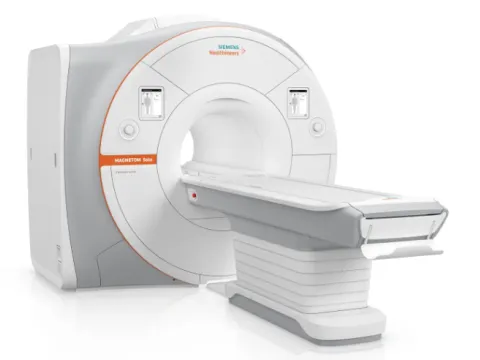- AdventHealth


Residents in Gordon and Murray Counties in northern Georgia can now receive world-class neurology and stroke diagnosis closer to home through a new telemedicine partnership between AdventHealth Gordon and AdventHealth Murray and Erlanger Health System.
“We are pleased to partner with Erlanger Health System to provide our patients with tele-neurology care,” said Pete Weber, president and CEO of AdventHealth Gordon and AdventHealth Murray. “With the strong alliance between our facilities and this advanced technology, patient care will only continue to improve.”
The new partnership with AdventHealth Gordon and AdventHealth Murray will improve access to specialty trained stroke neurologists to consult and diagnose reducing the time for lifesaving treatment for patients suffering from stroke. By offering access to neurology specialists through telemedicine, some patients may even have the opportunity to receive stroke treatment closer to home rather than transferring to another medical facility.
“Erlanger Health System has teamed up with leaders in the telemedicine industry to offer regional hospitals trained specialists and new technologies to identify stroke as well as provide guidance on the best medical care for the patient,” said Dr. Thomas Devlin, co-director of Erlanger’s Southeast Regional Stroke Center.
“This tele-neurology collaboration highlights our joined commitment with AdventHealth Gordon and AdventHealth Murray to provide excellent care to those suffering from an acute neurological emergency, such as stroke,” said Matthew Shafer, Erlanger’s administrative director of telemedicine. “Telemedicine has proven time and time again to be a powerful tool in expanding lifesaving specialty care throughout a larger region.”
Stroke is the fifth leading cause of death, the leading cause of disability in the United States and affects patients of all ages. The disease happens when a blood vessel carrying blood and oxygen to the brain is blocked or ruptures, decreasing the amount of blood flow to the brain cells. Risk factors for stroke disease can include high blood pressure, diabetes, heart disease, high cholesterol, obesity, smoking, family history of stroke and prior stroke or transient ischemic attack.
In order to receive faster diagnosis and medical treatment, people must first recognize the signs of stroke, FAST, (Facial drooping, Arms drifting downward, Speech is slurred and Time is brain) and call 911 immediately.
Recent News

AdventHealth Avista Recognized as a Top Teaching Hospital in Colorado for Patient Safety and Quality Care
For patients and families, feeling safe, heard, and well cared for is foundational to healing. That commitment to whole-person care is why AdventHealth Avista has been recognized as one of Colorado’s...

Phoebe Carpenter, APRN-CNP, joins AdventHealth Medical Group Family Medicine, Internal Medicine & Pediatrics at Curtis Parkway
AdventHealth is pleased to announce that Phoebe Carpenter, APRN-CNP, has joined AdventHealth Medical Group Family Medicine, Internal Medicine & Pediatrics at Curtis Parkway.

Pilot survives heart attack thanks to Flight 1 and whole-person connected care
From ER to air to cath lab, a seamless system delivered lifesaving treatment in under 90 minutes.

Pulmonologist joins AdventHealth Waterman
From nutrition and ICU to advanced bronchoscopy, Dr. Alba Rivera-Díaz brings bilingual, whole-person lung care to Lake County.

AdventHealth Avista opens food pantry to support community health
AdventHealth Avista has taken a significant step toward addressing food insecurity, a key priority identified in its Community Health Needs Assessment by opening a food pantry on its first floor. This...

AdventHealth Porter Earns COPPER Designation, Strengthening Pediatric Emergency Care
AdventHealth Porter is proud to announce that its Emergency Department has earned the Pediatric Advanced COPPER designation, a significant milestone that reflects a deep commitment to providing safe...

Three AdventHealth hospitals in Florida’s Volusia and Flagler counties earn top Leapfrog honors
Residents of Volusia and Flagler counties now have national confirmation of something many rely on every day: safe, high-quality hospital care close to home.

AdventHealth DeLand investing in next-generation MRI technology to enhance patient care
AdventHealth DeLand will soon install a new MRI system designed to deliver faster exams, sharper images and a more comfortable experience for patients in West Volusia.

Innovative new procedure offers hope for heart transplant candidates at high risk for rejection
Innovation at AdventHealth is driven by one purpose: helping people heal in body, mind and spirit.

The hidden cancer one clinician caught – and the process improvements she says matter most
Shana Vongkhankeo, APRN, discovered an unusual thyroid enlargement during a routine physical for a teenage patient, leading to a life-saving cancer diagnosis that highlighted how being fully present...

AdventHealth debuts first-of-its-kind Performer Health Program in Central Florida
AdventHealth is launching the Performer Health Program, a first-of-its-kind initiative in Central Florida focused on addressing the unique health needs of artists and performers.

How to stay mindful in body, mind and spirit this holiday season
As holiday demands grow, mindfulness provides a simple tool to stay present and steady, offering support for the mind, body and spirit during a busy season
